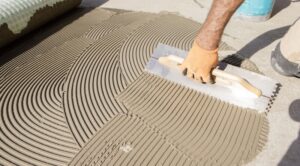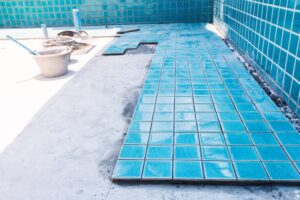Imagine spending thousands on pool tiling, only to see tiles pop off or cracks appear. Frustrating, right? Many homeowners assume that swimming pools are naturally waterproof, but that’s not the case. The concrete shell of a pool is porous, meaning pool water can seep through, leading to damage over time.
This brings us to an important question: Do you need waterproofing before tile installation? Some believe that porcelain pool tile and glass mosaic tiles create a watertight seal. In reality, without a waterproofing membrane, your entire pool is at risk of leaks, adhesion loss, and long-term damage.
In this blog, we’ll explore why waterproofing is the first step in ensuring a durable tiled pool and how it impacts the longevity of your pool structure.
Table of Contents
ToggleWhat Is Pool Waterproofing?
Waterproofing is a crucial step before pool tiling. Many assume that porcelain tiles or swimming pool tiles create a waterproof seal, but that’s a common misconception. The pool surface, especially the concrete shell, is naturally porous, allowing water to seep through. Without a waterproofing membrane, water can escape (egress) or enter (ingress) the pool structure, leading to cracks, adhesion loss, and expensive repairs.
Waterproofing prevents these issues by forming a protective barrier between the pool surface and the tile pool finish, ensuring a strong bond between the porcelain tile and the mortar bed. When properly applied, waterproofing helps maintain the integrity of pool tiling, preventing water damage and extending the installation’s life.
Common Pool Waterproofing Methods

Waterproofing Technique | Purpose & Use |
Cementitious Coatings | A popular choice for new pools; forms a non-porous, rigid waterproof layer suitable for concrete pool applications. |
Liquid-Applied Membranes | Creates a flexible, smooth barrier that adapts to minor movement, reducing the risk of cracks in installed tiles. |
Sheet Membranes | Provides a pre-fabricated waterproofing layer that ensures consistent coverage and reduces adhesion loss. |
Proper pool waterproofing ensures durability, reduces maintenance costs, and protects the entire surface before you start tiling. Without it, even the best pool tiling can fail over time.
The Role of Waterproofing in Pool Tiling

Are you planning in tiling your pool? waterproofing might not be the first thing on your mind, but skipping this step can lead to serious problems. Without a waterproof barrier, moisture seeps into the pool structure, weakening the pool tile installation over time. Here’s why waterproofing is a must.
Preventing Structural Damage
Water finds its way into cracks, weakening the concrete shell of your pool. Over time, this can cause deterioration, leading to leaks and expensive pool resurfacing. Think of waterproofing like a raincoat—just as you wouldn’t step into a storm without protection, your pool builder shouldn’t install tiles on an unprotected surface.
For example, pools without waterproofing often develop calcium carbonate deposits, leaving unsightly stains on tile and plaster and waterproofing seals the pool size and structure, preventing these issues before they start.
Enhancing Tile Adhesion and Longevity
Tiles need a solid, properly prepared base to stay in place. Moisture can weaken the adhesive without waterproofing, leading to delamination—where tiles loosen and fall off. Waterline tile is especially vulnerable because it’s constantly exposed to water and chemicals.
Waterproofing ensures a minimum thickness bonding layer that keeps tiles secure, reducing costly repairs down the line.
Mitigating Efflorescence Issues
Have you ever noticed a chalky white buildup on pool tiling? That efflorescence is caused by minerals rising to the surface when water seeps through the pool structure. Waterproofing prevents this by stopping moisture from moving through the concrete.
A well-sealed pool means fewer maintenance headaches and a longer-lasting pool tile installation. Protect your investment—ensure waterproofing is part of the process before pool tiling begins.
Consequences of Skipping Waterproofing
Skipping waterproofing before pool tiling might seem like a tiny oversight, but it can lead to major headaches down the road. Without a waterproof barrier, moisture seeps into the pool structure, weakening the tile installation and causing long-term damage.
Here’s what can go wrong:
- Leaks and Structural Damage – Water infiltration weakens the concrete shell, leading to cracks and costly repairs.
- Tile Adhesion Failure – Moisture under tiles causes delamination, making tiles pop off over time.
- Efflorescence Stains – White, chalky deposits form on tiles due to trapped moisture, ruining the pool’s appearance.
- Higher Maintenance Costs – Leaks and loose tiles lead to frequent pool tile installation repairs, costing you more in the long run.
Waterproofing protects your investment, ensuring a durable, long-lasting tile pool project. Don’t risk expensive repairs—seal before you tile!
Trust Professional Pool Contractors for a Lasting Investment
Waterproofing is a non-negotiable step before pool tiling. Without it, moisture seeps into the pool structure, leading to cracks, loose tiles, and costly repairs. A properly sealed surface ensures durability, protecting your pool tile installation for years to come.
Don’t leave such a critical step to chance. Work with experienced professionals like Professional Aquatic Services to ensure your pool tiling is right. Their expertise ensures waterproofing is applied correctly, preventing future headaches.
A well-built pool is an investment—make sure it’s protected. Consult a professional pool contractor today.

